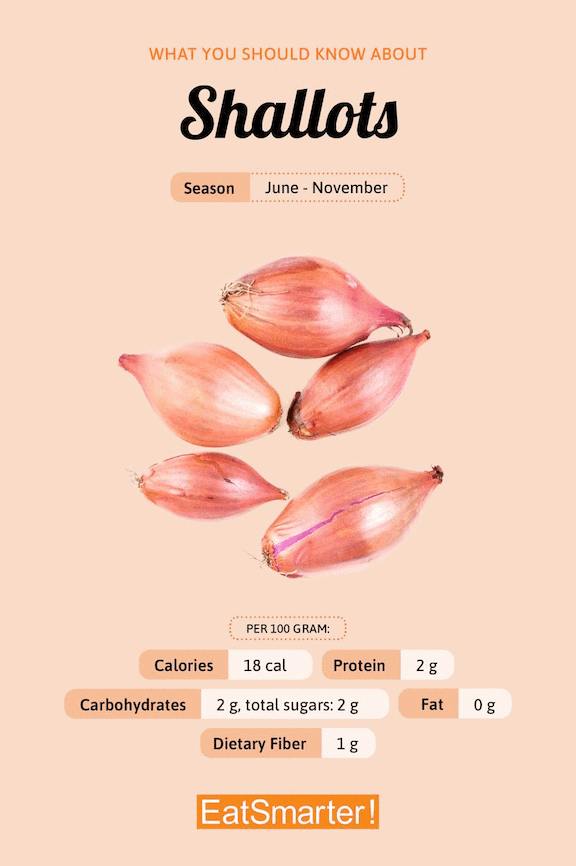Shallots
Shallots have long been a staple in French cooking, and have recently enjoyed a culinary resurgence in the U.S. thanks to chefs like Alison Roman.
Shallots...
- ...support gut health.Shallots are rich in fiber and sulphur-containing essential oils, which help boost digestion and keep gut bacteria healthy. A healthy gut also helps support a healthy immune system.
- ...are rich in vitamins.Shallots contain essential B vitamins and about 10 mg of immune-boosting vitamin C per 100 gram serving.
- ...have antibiotic properties.Shallots get their typical oniony taste from their rich supply of essential oils, which can act as a gentle antibiotic, helping render certain bacteria harmless.
- ...can help you stay fit.Shallots are rich in fiber, which helps satiate the appetite, and are low in calories and fat.
- ...have a more mild taste than onions.Anyone who finds onions too pungent will love shallots, as they have a characteristic onion-y, yet more delicate flavor.
- ...can lead to bloating.Shallots' essential oils can produce excess gas in those with sensitive stomachs.
What You Should Know About Shallots
While shallots are technically considered an onion, they definitely contain many unique characteristics. Shallots' abundant essential oils provide a deeply savory, characteristic onion-y flavor, but are notably more delicate and sweet than their onion cousins. They're also much smaller than onions, and won't make you cry when you cut them!
Shallots have long been a staple of French cooking, and have become increasingly popular in the U.S. thanks to young new chefs like Alison Roman, who champion this noble, delicious ingredient.
Origins
Botanists suspect the shallots' original home lies in Central Asia, as the modern shallots' ancestor, called the "grey shallot", comes from Uzbekistan, Tajikistan, Kyrgyzstan and Afghanistan. Today, the majority of shallots are imported from Mexico.
Season
Young shallots are in season from June through the fall.
Flavor
The shallot tastes similar to the onion, but much milder.
Our Favorite Recipes With Shallots
Find all our shallot recipes here.
How Healthy Are Shallots?
Like all onions, shallots are a particularly healthy vegetable. Their main advantage are their numerous sulphur-containing essential oils, such as allicin, which are particularly beneficial for the intestines. They are also abundant in various B vitamins, minerals and vitamin C, and contain hardly any fat or calories.
| SHALLOT NUTRITIONAL INFO (100 g) | |
|---|---|
| Calories | 18 |
| Protein | 2 g |
| Fat | 0 g |
| Carbohydrates | 2 g |
| Fiber | 1 g |
Shopping and Cooking Tips
Purchasing
You can tell the quality of a shallot by its appearance: the skin should be evenly dry and dark brown in color. If you want a particularly subtle and mild taste, it's best to use very small shallots; larger ones usually have a more pungent, onion-y flavor.
Storage
Good quality shallots can be kept at room temperature for up to two weeks or longer without any problems. Very small shallots however dry out relatively quickly and should therefore not be left lying around too long. Store shallots in an airy and dry place, preferably in a basket or open dish.
Preparation
Preparing a shallot is much like peeling an onion, except that shallots can be a bit harder to peel than onions. However there's a trick that can make peeling much easier: put the shallots in a bowl and pour boiling water over them. Let it stand for 1-2 minutes. Put cold water and a few ice cubes in another bowl. Now lift the shallots out of the hot water and dip them into the cold water. Then take them out and let them drip off a little. Now you can easily peel the skin of the shallots with a small sharp knife.
What to Make With Shallots
Just like its onions, shallots are incredibely versatile and add tons of flavor to nearly any savory dish. As a culinary rule of thumb, if a recipe calls for onions you can almost always replace it with shallots if you want a somewhat more mild and delicate taste. Shallots' strong flavor pairs particularly well with red and game meat dishes, and especially well with recipes that call for red wine.

















